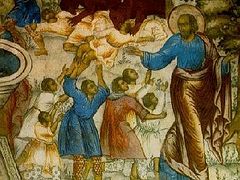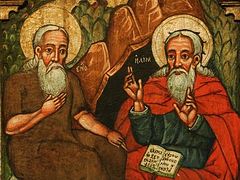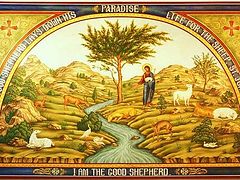Today, brothers and sisters, we find in the epistle reading1 an interesting interpretation of the Old Testament Texts by New Testament thought. The Apostle Paul quotes from the Prophet Isaiah and subsequently provides commentary on it: In an acceptable [favorable] time I have heard You, And in the day of salvation I have helped You; (Isaiah 49:8) – Paul quotes, and adds: Behold, now is the accepted time; behold, now is the day of salvation (2 Corinthians 6:2).
Correlation of the prophecy with the commentary reveals a rather important topic. In the context of the Book of Isaiah, in the phrase “In an acceptable [favorable] time I have heard You, And in the day of salvation I have helped You”, God the Father speaks to the Messiah who is to come. The Prophecy is about the Heavenly Father helping His Son Jesus Christ, in the days of his ministry on earth, and especially during his suffering on the cross; here it’s using the “Prophetic Past Tense”, if you will.
Isaiah for the sake of expressing the certainty of the future, speaks of these events in a past tense language, i.e. “I heard”, and “I helped”, in the sense of “I will hear and help”.
And so it was: we see in the Gospel, that God the Father never for one moment abandoned His Son, and instead He fulfilled all His prayers.
However, the Apostle Paul takes this, and places it in a new context. Saint Paul relates these words to the Church and believers: Behold, now is the accepted time; behold, now is the day of salvation, he says, urging Christians to work hard for their salvation today, without tarrying till tomorrow.
At first, it would seem that Paul is committing an unaccepted [error] – taking what he is quoting out of context – but this is not the case. If we dig deeper, we will see a completely different picture in this place [and see the quote in a totally different light.—Trans].
The fact is that the Church is by definition, in scripture, the Body of Christ.
Ancient Christians very vividly experience this most crucial characteristic of the nature of the church. They felt and understood, that everything which happened with Christ directly affects their lives, even in the sense that it must happen to them. Thus, Christ preached, and the Church must preach. Christ was persecuted, and the Church must be persecuted. Christ heard [listened], and the Church must hear. Christ was crucified, and the Church, in its innermost being, is crucified for the World.
The Heavenly Father did not abandon Christ, and He will not abandon us. In an acceptable [favorable] time I have heard You, And in the day of salvation I have helped You; God says not only to His Son, but also to His Church, and therefore, to all of us. Therefore, Paul boldly addresses these words to contemporary believers.
The New Testament is full of such examples. The fourth chapter of Acts tells how two of the apostles, Peter and John were first arrested for preaching. They were released, and they returned to the community [of believers.—Trans.] to tell them about their arrest. Then, the first prayer of the New Testament Church is described:
So when they heard that, they raised their voice to God with one accord and said: “Lord, You are God, who made heaven and earth and the sea, and all that is in them, who by the mouth of Your servant David have said: ‘Why did the nations rage, And the people plot vain things? The kings of the earth took their stand, And the rulers were gathered together Against the Lord and against His Christ.” (Acts 4:24-26)
Where do these words come from? From the Second Psalm: Why do the nations rage, And the people plot a vain thing? The kings of the earth set themselves, And the rulers take counsel together, Against the Lord and against His Christ2. It is not difficult to understand that the psalm is messianic, and reflects the events of the last days of the earthly life of Jesus Christ; these words are about Him, about Christ. But the early Church, perfectly aware of all this, addresses these words to itself, because the Church is in a way, the continuation of the earthly life of Christ. The Church is His Body; therefore, all messianic prophecies directly concern also the Church of Christ.
All this is extremely important for our self-consciousness as a Church. For example, we too, following the example of ancient Christians, read the Psalter in church meetings. Just like with the example from Acts, a large part of this book, if not the whole book in its entirety, is about the Messiah, about Christ.3
It speaks about enemies surrounding Him, and about His victory over them4, about His humiliation5 and His glorification, about His preaching and His suffering, about His resurrection and ascension, about the Terrible Judgment over which He will preside, etc. And we often perceive these messianic meanings through various life events of King David, who is a prototype of Christ. A question arises, that is: do we read this simply to remember the prophecies about the Savior, or to remember the life of David, or is there something more?
Of course, there is something more. We not only read about the Savior or about David, we read about the Church and about ourselves. For example, at Matins [during Vigil]6, during “God is the Lord”, we sing lines from the Psalm 117: Surrounding me they compassed me, and by the name of the Lord I warded them off (Psalm 117:11). This song was sung by the ancient Hebrews during the great holidays, recalling the intercession of God for them.
At the same time, the words of the Psalter depict the full persecution of the life of the Savior, and especially His suffering on the Cross. But we also apply this psalm to ourselves: We remember that the enemies of Christ did not die off, they are alive, and they must be our enemies.
In our situation, these are impure spirits, and our own passions and sins with which we fight. Surrounding me they compassed me, and by the name of the Lord I warded them off – we say this about this struggle, calling on The Lord for help. So, do we take this verse out of its context? No! As members of the body of Christ, we are spiritually participating in this context.
The same thing happens when we prayerfully read the entire Scripture. There – every line about Christ is also about us, after all, we belong to Christ. We are His children, His friends, His relatives, and members of His Body. And every word of the Savior, just like every prophetic word about the Savior, must somehow be fulfilled in our lives (in its own measure). We need to learn, brothers and sisters, to read Scripture as a book about our spiritual life.
The fall and uprisings of the characters of this book are my falls and uprisings. The commandments given to these characters are given to me. The earthly life of the Savior is an image that combines the fullness of the life of every Christian, and all Christians united in the Church of Christ. With these eyes the Ancient Christians looked at the Scriptures, and we too should see it with these eyes.
Let us love the Scriptures, let us study the Scriptures, let us learn how to live by it, and – God willing – the immortal biblical lines will become [also] the narrative of our life, death, and resurrection together with all the Saints who love God and His word.




